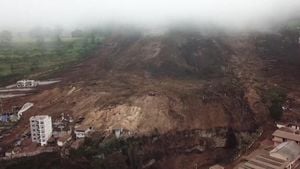The establishment of centralized animal slaughter facilities plays a significant role in improving food safety and reducing environmental impacts, yet Vietnam continues to grapple with policies aimed at attracting investment to this sector. According to Nguyen Thi Nga from the Institute for Public Policy and Rural Development, these facilities are integral to mitigating disease transmission and ensuring product quality. The current policy framework, unfortunately, hampers potential investments due to insufficient incentives and complex regulatory procedures.
Since the introduction of the Investment Law of 2020, the Vietnamese government has been committed to enhancing investment opportunities. This law seeks to draw both domestic and foreign capital by offering various incentives including tax breaks and infrastructure support. Despite these intentions, the actual implementation of investment attraction policies appears to be falling short.
While there exist some centralized facilities, as of 2023, the number is limited. The report indicates there are 463 centralized animal slaughter facilities currently active across Vietnam. Each of these facilities plays a pivotal role not just in processing meat but also as checkpoints for disease control, assisting to maintain high standards of food safety by ensuring meat products do not carry harmful residues and are safe for consumer health.
Nevertheless, the infrastructure necessary for these facilities is riddled with challenges. Many facilities operate at less than optimal capacity due to high start-up costs and the preference of consumers for lower-priced products available from smaller, informal slaughter operations. For example, it's reported many facilities are only operating at 15 to 30 percent of their design capacity, highlighting inefficiencies and the need for greater streamlining of operations.
Nguyen Thi Nga highlights several issues being faced: "Lack of attractive incentives, complex administrative procedures, and inadequate infrastructure hinder investor participation." Indeed, the Vietnamese government has implemented measures intended to create safer, more efficient environments for investment, but much work remains to be done.
Investment policies include tax benefits such as exemption from income tax for up to two years and 50% reductions for another four years for businesses operating under difficult socio-economic conditions. Yet, compliance and bureaucratic hurdles often derail these potential benefits for investors. Investors still express concerns over the length of the application process and the bureaucratic burden involved.
Looking at successful cases of investment attraction reveals mixed success stories. Some localities have implemented key initiatives to boost their centralized slaughter facilities through improved infrastructure, disease control measures, and financial support from both state and regional governments. These advances are encouraging but must be replicated across the country.
Reports indicate countries like Japan and members of the EU have rigorous safety standards for meat processing. Meeting these sophisticated requirements necessitates modernization of Vietnamese facilities and the implementation of advanced technologies to assure compliance.
To tackle the identified challenges, experts recommend several strategic changes. There is a strong call for enhancing the incentives system to make investment more appealing by eliminating bureaucratic delays and increasing transparency about the investment process. Streamlined procedures and enhanced infrastructure remain at the forefront of improving this sector.
Investors should also be encouraged to form partnerships with local farmers to maintain consistent meat supply, which is another hurdle faced due to the reliance on small-scale producers who may not meet the requirements set by centralized facilities.
Addressing industry demands requires stakeholders to collaborate constructively, improving investment policy frameworks, and public awareness campaigns about food safety and environmental impacts from proper waste management.
The conclusion emphasizes the urgent need for reforming the investment policy framework, enabling not only sustainable growth of the centralized animal slaughter sector but also contributing positively to food security and safety throughout Vietnam. By committing to these changes, the government can facilitate more significant investment opportunities, thereby bolstering economic development and enhancing public health outcomes across the nation.



